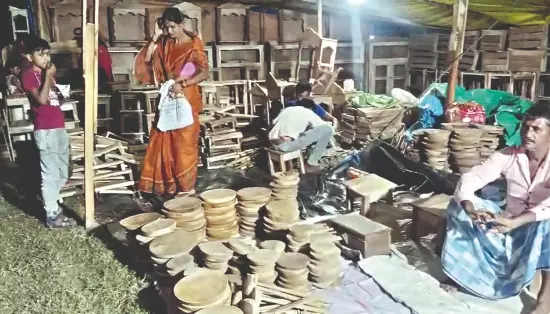Heritage lives on as 250-year-old ‘Charu Seth’s Fair’ begins in Malda

Malda: The rhythmic sound of chisels and hammers once again filled the air along the banks of the Mahananda River as the 250-year-old “Charu Seth’s Fair” begins in Mogoltuli, Ward No. 5 of the Old Malda Municipality. What started nearly two-and-a-half centuries ago as a small village gathering to sell handmade wooden goods has now become a symbol of Bengal’s living craftsmanship and heritage.
Locals say the fair traces its origin to Charu Seth, a member of the renowned Seth family of Old Malda, who first organised the event after the Lakshmi Puja, nearly 250 years ago. Back then, the fair was accompanied by traditional boat races on the Mahananda River — a festive spectacle that has since disappeared. What remains, however, is the spirit of craftsmanship, preserved through generations of artisans who continue to bring their handmade wooden creations to the fair each year. “This fair is our identity,” says local craftsman Ratan Mondal, who has been selling wooden beds, almirahs, spatulas, and traditional kitchen tools for decades. “We don’t just sell furniture; we carry forward a heritage that began with our ancestors.”
The fair, popularly known today as the Wooden Fair of Old Malda, officially opened on Tuesday and will continue until Kali Puja. The event has drawn artisans and buyers from across Bengal, with items selling at nearly half the market price. “A bed that costs Rs 50,000 in the market is available here for Rs 20,000 to Rs 25,000,” said another vendor proudly.
On the opening day, Old Malda Police Station IC Soumen Chakraborty inspected the fairgrounds, reviewing security and sanitation arrangements. He also checked food stalls to ensure proper hygiene.
Fair committee member Bashisthya Trivedi remarked: “This is not just a market — it’s our cultural heritage. For 250 years, this fair has been the pride of Old Malda. Even though the boat races have stopped, the legacy continues through the craftsmanship of our people.”
As dusk settles over the Mahananda, the glow of lamps flickers on polished wooden furniture — a quiet reminder that heritage is not only about monuments, but about traditions that live on through the hands of the people.



